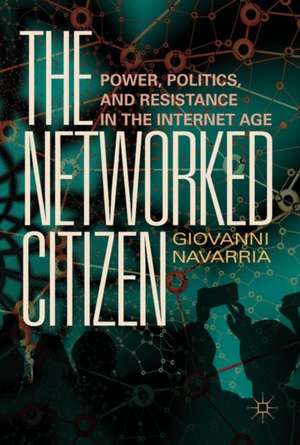The Networked Citizen: Power, Politics, and Resistance in the Internet Age
Autor Giovanni Navarriaen Limba Engleză Hardback – 12 noi 2019
The book challenges the traditional understanding of power through which the strong typically prevails over the weak. This leads to a clearer understanding of the wider role citizens can play (and must play) in a networked political sphere, while it also warns the reader on the many risks citizens face in a post-truth world.
The book challenges the traditional understanding of power through which the strong typically prevails over the weak. This leads to a clearer understanding of the wider role citizens can play (and must play) in a networked political sphere.
Preț: 531.91 lei
Preț vechi: 625.78 lei
-15% Nou
Puncte Express: 798
Preț estimativ în valută:
101.78€ • 106.54$ • 84.71£
101.78€ • 106.54$ • 84.71£
Carte tipărită la comandă
Livrare economică 31 martie-14 aprilie
Preluare comenzi: 021 569.72.76
Specificații
ISBN-13: 9789811332920
ISBN-10: 9811332924
Pagini: 279
Ilustrații: XIII, 310 p. 32 illus., 20 illus. in color.
Dimensiuni: 148 x 210 mm
Greutate: 0.54 kg
Ediția:1st ed. 2019
Editura: Springer Nature Singapore
Colecția Palgrave Macmillan
Locul publicării:Singapore, Singapore
ISBN-10: 9811332924
Pagini: 279
Ilustrații: XIII, 310 p. 32 illus., 20 illus. in color.
Dimensiuni: 148 x 210 mm
Greutate: 0.54 kg
Ediția:1st ed. 2019
Editura: Springer Nature Singapore
Colecția Palgrave Macmillan
Locul publicării:Singapore, Singapore
Cuprins
1. In Search of the Good Citizen.- 2. A Different Kind of Society.- 3. The Networked Citizen.- 4. The Moveon Model.- 5. A Model Imitated: From Dean to Obama.- 6. The First Twitter President.- 7. The Berlusconi Era.- 8. The Five-Star Movement.- 9. Control of Media.- 10. The Party's Greatest Ally.- 11. Power as Shared Weakness.- 12. What Kind of Citizens We Want to Be.
Notă biografică
Giovanni Navarria is an associate of the Centre for Political Thought at the University of Exeter. Previously, he has worked as Lecturer and Research Fellow at the University of Sydney, at the Wissenschaftszentrum Berlin für Sozialforschung, and at the University of Westminster. His academic background and research approach is interdisciplinary; it lies at the intersection between politics, power and the media (particularly the Internet). In his research, he uses philosophy, political theory and media theory to challenge prevailing notions of citizenship, civic engagement and political power. He has a PhD from the University of Westminster and a Degree in Philosophy from the University of Catania. At the University of Sydney, he has taught Postgraduate Units of Studies in the field of Public Opinion, New Media and Public Relations, Politics and International Relations. As Associate of the Sydney Democracy Network, he launched and co-edited an article series called Democracy Futures and wrote a regular column titled Networked Politics for The Conversation Australia.
Textul de pe ultima copertă
This book investigates the changing meanings of power and politics in the Internet age and questions whether the political category of the citizen still has a meaningful role to play in the highly-mediated dynamics of an increasingly networked world. To answer such questions, the book analyses and compares the impact of the Internet on the relationship between state, citizens, and politics in three countries: the USA, Italy, and China. The book’s journey starts in the mid-90s and ends in 2016. It pays particular attention to Obama 2008 and Trump 2016 presidential campaigns, the ascendance to power in Italy of the anti-establishment Five Star Movement, and to the enduring Chinese government’s struggle to control the Internet public opinion. The book challenges the traditional understanding of power through which the strong typically prevails over the weak. This leads to a clearer understanding of the wider role citizens can play (and must play) in a networked political sphere, while it also warns the reader on the many risks citizens face in a post-truth world.
Giovanni Navarria is an associate of the Centre for Political Thought at the University of Exeter. Previously, he has worked as Lecturer and Research Fellow at the University of Sydney, at the Wissenschaftszentrum Berlin für Sozialforschung, and at the University of Westminster. His academic background and research approach is interdisciplinary; it lies at the intersection between politics, power and the media (particularly the Internet). In his research, he uses philosophy, political theory and media theory to challenge prevailing notions of citizenship, civic engagement and political power. He has a PhD from the University of Westminster and a Degree in Philosophy from the University of Catania. At the University of Sydney, he has taught Postgraduate Units of Studies in the field of Public Opinion, New Media and Public Relations, Politics and International Relations. As Associate of the Sydney Democracy Network, he launched and co-edited an article series called Democracy Futures and wrote a regular column titled Networked Politics for The Conversation Australia.
Caracteristici
Presents an interdisciplinary approach focusing on the relationship between politics and the Internet Provides a blueprint to understanding the transforming effect that the communication revolution has had on the way in political power is exercised Includes in-depth analyses of media tactics of anti-establishment parties
